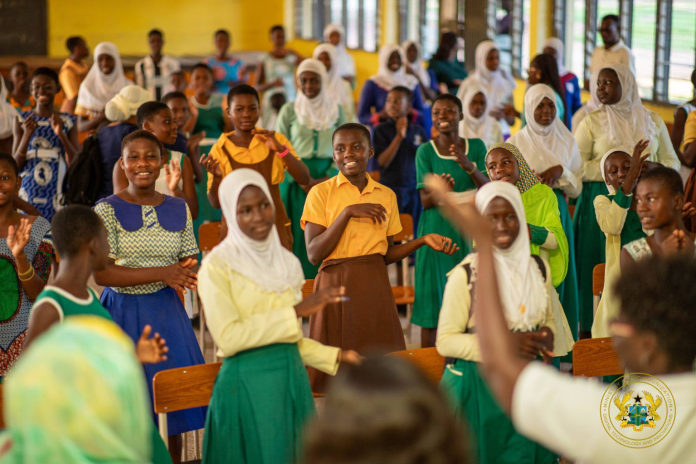Deputy Minister for Communication, Digital Technology, and Innovation Mohammed Adams Sukparu visited the National Girls in Information and Communications Technology (ICT) Project in the Upper West Region, using the inspection to advocate for making ICT a mandatory curriculum subject alongside mathematics and science.
The visit took Sukparu to McCoy College of Education in the Nadowli-Kaleo District and Wa Senior High School, where he interacted with students and teachers participating in the programme. As Member of Parliament for Sissala West, his presence connected national policy with constituency-level implementation.
Sukparu framed the initiative as reflecting President John Dramani Mahama’s personal commitment to technology inclusion, describing it as a cornerstone of government’s inclusivity agenda. The programme provides scholarships, job placement support, and practical digital training aimed at helping young women compete in technology sectors where gender disparities remain pronounced.
The call to integrate ICT as a core subject represents a significant curriculum expansion proposal. Currently, ICT exists in Ghana’s education system but not with the universal mandatory status of subjects like mathematics, English, and science. Elevating it to core subject status would require Ghana Education Service (GES) approval, curriculum development resources, teacher training at scale, and equipment investments across schools.
Those requirements are substantial. Many Ghanaian schools, particularly in rural areas, lack consistent electricity supply, adequate computer labs, or teachers trained to deliver ICT instruction. Making ICT mandatory without addressing infrastructure gaps risks creating requirements schools cannot meet, potentially widening educational disparities between well-resourced and under-resourced institutions.
Sukparu linked the Girls in ICT project to the upcoming One Million Coders Initiative, suggesting beneficiaries would have pathways to advanced skills development and tech entrepreneurship. That connection positions the girls’ programme as a pipeline into broader digital skills training rather than a standalone intervention.
The One Million Coders Initiative aims to train one million Ghanaians in software development and related technical skills. Announced as part of the government’s digital transformation agenda, the programme’s implementation details, including funding sources, training delivery mechanisms, and quality assurance processes, remain under development.
For girls participating in the current ICT project, the promise of progression into advanced training matters significantly. Technology education without clear pathways to employment or entrepreneurship can generate skills that don’t translate into economic opportunities. The deputy minister’s framing suggests awareness of that gap, though concrete connections between the two programmes weren’t detailed.
Mary Haruna, District Chief Executive for Nadowli-Kaleo, participated in the inspection, reflecting what the report characterized as government’s coordinated approach to promoting technology education across regions. Local government involvement in implementation matters because districts control resources and administrative support that determine whether national programmes function effectively at school level.
The Upper West Region faces particular development challenges, including infrastructure limitations and economic constraints that affect educational outcomes. Targeting technology inclusion efforts there addresses geographic disparities in digital access and skills development that could otherwise concentrate tech opportunities in urban southern regions.
Gender gaps in technology education and employment remain persistent globally and in Ghana specifically. Women and girls are underrepresented in ICT degree programmes, technology companies, and technical roles across sectors. Multiple factors contribute to these disparities, including social expectations, educational tracking, role model scarcity, and workplace cultures that can discourage female participation.
Addressing those gaps requires sustained interventions beyond short-term training programmes. The Girls in ICT project represents one component of what needs to be comprehensive ecosystem development including curriculum changes, teacher training, industry partnerships for internships and employment, mentorship programmes, and workplace culture shifts in Ghana’s technology sector.
Sukparu assured stakeholders that the Ministry would continue monitoring programme progress and indicated that Communications Minister Samuel Nartey George would conduct an official commissioning visit. That ministerial attention signals political prioritization, though monitoring effectiveness depends on establishing clear metrics and accountability mechanisms beyond high-profile visits.
The deputy minister’s call for ICT as core curriculum subject raises questions about sequencing and capacity. Should Ghana prioritize achieving universal ICT instruction before making it mandatory, or does core subject status create pressure that accelerates infrastructure and teacher training investments? Different education policy perspectives would answer that question differently.
What’s clear is that digital literacy has become fundamental to economic participation in ways that make ICT education comparable in importance to traditional core subjects. Whether Ghana’s education system can operationalize that recognition through effective, equitable implementation across all schools remains the practical challenge beyond policy statements.
For the girls participating in the Upper West Region programme, the deputy minister’s visit and policy commitments matter primarily if they translate into sustained support, quality instruction, functional equipment, and genuine pathways into technology careers or entrepreneurship. Policy attention is necessary but not sufficient for those outcomes.
The broader test of the Girls in ICT initiative and related digital inclusion efforts will be measurable results: increased female enrollment in ICT degree programmes, more women entering technology careers, higher rates of female tech entrepreneurship, and narrowing gender gaps in digital skills and access. Inspection visits and curriculum proposals are inputs. Those outcomes are what ultimately determines success.
Source: newsghana.com.gh










